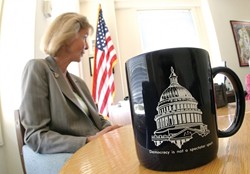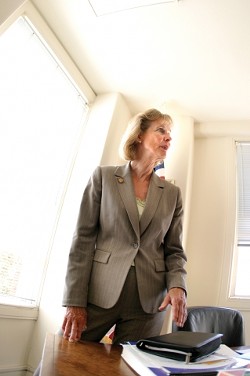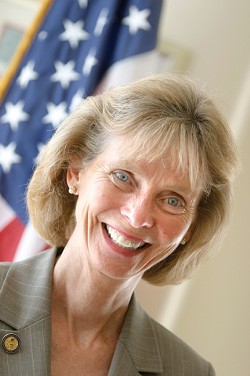[{
"name": "Ad - Medium Rectangle CC01 - 300x250",
"id": "AdMediumRectangleCC01300x250",
"class": "inlineCenter",
"insertPoint": "8",
"component": "2963441",
"requiredCountToDisplay": "12"
},{
"name": "Ad - Medium Rectangle LC01 - 300x250",
"id": "AdMediumRectangleCC01300x250",
"class": "inlineCenter",
"insertPoint": "18",
"component": "2963441",
"requiredCountToDisplay": "22"
},{
"name": "Ad - Medium Rectangle LC09 - 300x250",
"id": "AdMediumRectangleLC09300x250",
"class": "inlineCenter",
"insertPoint": "28",
"component": "3252660",
"requiredCountToDisplay": "32"
}]
Lois Capps entered the world of politics in March 1998, serving the 22nd Congressional District following the death of her husband Walter in October 1997. She was again elected to what is now the newly redrawn 23rd District in 2003. She plans to run again in 2006. This interview was conducted while she was on vacation in August. The follow-up on Hurricane Katrina was held last week.
Capps on Hurricane Katrina
How do you feel?
I feel devastated. The federal government did not respond the way it was supposed to. People thought that since 9/11 we had agencies in place like Homeland Security and FEMA, which we assumed was ready to take care of things if it were called upon. It's clear we let the ball drop. I just can't point my fingers because I work here too.
It seems as if people always answer the call,
never the government.
All of this has a role. But when we have a disaster the proportion that Katrina was, or 9/11, local officials are people you call upon. Citizens will rally, but citizens aren't in charge. We designate elected officials to organize a seamless, coordinated plan of response. I'm very concerned that planning wasn't in place. We should have had things in place before the disaster.
#What would you have said looking into the eyes of a lost child?
I would have to say, "I'm sorry. We weren't there to help you in the ways you needed help. And we want to
fix that and we need your help to tell us how we should do it best."
How can we do it best?
We can't wait for the next disaster to hit us, whether it's a terror attack or the big earthquake that's sure to come. We can't wait until the actual time of it and then say
who's supposed to do what. This is the height of folly. So we really need to buckle down, really prioritize - that's what we need to do here in the federal government. We need to re-focus on what direction the citizens of this country want us to take.
Capps on politics
Knowing what you know today, would you have wanted to become a congresswoman?
I can't really answer it, because none of us would know. In this I have to thank Walter. A lot of our staff started with Walter. But what a gift I have been given, because I wouldn't have come any other way.
Walter inspired you?
After having seen the process that Walter went through and how he came to decide to run and the way he conducted his campaigns - in '94, almost winning, and in '96, barely winning - in being a very different style of candidate... I was right there. I saw that happening - it was a remarkable process that I felt part of as well. As did all the people who worked very hard to get him elected. And then the staff that he had barely put in place in Washington and here in the districts, all that was frozen after he died. He knew the people he chose would offer the right kind of public service that would aspire to Thomas Jefferson's notions of the citizen representative and what democracy should be about.
I was all set to go away, but if I didn't run who was going to come in and do that?
So you really picked up Walter's mission and made it your own?
Not until Walter's last memorial service three weeks after he died was over did I begin to really think about it. I remembered how close Walter was to Governor Bob Kerrey [D-Nebraska], who called me right after the funeral. He knew people had already been talking to me, and said, "Lois, I think you should consider running, but if you do you're not doing this for Walter," and I remember going (sigh)... because that was my strongest motivation.
He said, "It's not going to be his name on the ballot. You need to run on your own ." So that put the fear of
God into me. But it didn't stop me. I could promote Walter's ideas even if I didn't use his name... that was my message inside of me. So I had to stop and think about what skills I could bring. Being a nurse and working in public education were two.
But it was amazing to me how some pundits would say, "Hey, you're just a nurse, what are you doing running
for Congress?"
Legitimate question.
People think there's a qualification that you have to have if you're a member of Congress. The Constitution wasn't written that way. And neither was the experience of the founders. What did Thomas Jefferson say? Put down your plow or instruments of trade and go to Congress for a while.
Did the sympathy vote bother you?
Some people can legitimately say, "You played on people's sympathy and you got elected that way." Well, that first year I was on the ballot four different times. And you know, maybe it got me there, but I couldn't rely on that. I did hear a fair amount of, "What right do you have to take your husband's seat? You weren't elected." So I had to prove myself.
What did your family think?
I didn't do it without asking my kids. Nobody said no. The biggest question is, why did Walter re-run? Believe me, he gave them a hard time in the beginning. He persisted.
What reasons did you tell him not to run?
"You're a good schoolteacher, Walter, why do you want to do that? Why do you want to run for office?"
#The Capps' family resilience...
what has that done for you?
Makes me aware of how much I owe. And to keep that tradition going. Walter somehow knew you could be a professor of religious studies and go to Congress. He thought he could, and he did it, and it's very precious to me. And it's an enormous strength. But I am also one who is very mindful that I'm only one person. I am fortunate enough to have a group of really good people around me. We have great energy. We're a family. It's way bigger than me, so we just keep that going.
How do you do it?
By having the right people around me who wouldn't let me get away with any other way. And see, Walter chose them. And that is how he saw it, too.
But it's all about making a difference. I mean being where we ought to be. To be making the world a better place... all those corny phrases are really true. No matter where we are we can wake up every morning and say that's what we're going to do today.
I work pretty hard to keep that same grounding that I had as a school nurse, or the feeling of authenticity about being a parent as being pretty darn important too.
Don't you find politics frustrating?
Yeah. Politics in school districts are not the hottest either. Or at the university. Or within the media. It's a lot because it's portrayed that way. Everything is in big, bold, splashy letters in Washington, D.C.
But in many ways it's what happens every day in how we interact. We're the same kind of people, all of us in Congress. We're somebody's neighbor. We're part of a community. We all have to be elected. And yes, there's a lot of barriers to having it be a pure democracy. But the ingredients are there.
What about compromise?
First of all, there is not a position I've ever seen that gives pure results where there's nothing messy about it. Part of your day you wish you didn't have to spend doing what you're doing - whatever it is, all of us do. So there's that. But there's always that. Here I am and I'm in the minority side; we had a few bills that passed. I work really hard to get good legislation through. And a lot of the time I'm on the no vote because when it comes right down to it, I can't justify supporting it, but yet we go back for more because there's this hope that we're going to make it better. And it's not all bad.
Is winning everything?
We're all in it together. Many democrats and I differ on many issues. All of us are there having come to that place the same way, all 435 of us. There are extremists on both sides of the aisle... there are some people that I can't stand, frankly, but there is a bond that we share. Because we all understand that you have to win the vote. You can say there are special interests and all, but in the end, people are going to go into a voting booth and no matter how they do it, they're going to mark somebody's name by a ballot and all of us want them to mark our names - and whatever you go through to get that to happen, that's how we get there.
How do you handle criticism?
Being able to take criticism is something I have had to learn to do. And I've learned very quickly there are several kinds; the kind you expect in a heated campaign. It's when your friend turns on you, people you thought you could trust... that's hard. But I always know nobody goes through this unscathed at all. But I always know that there are always people around me. My family is always there, and we work as a team here, and there are allies I know I can go to. I've learned over the years not to take things for granted and find I always have to prove myself.
Do have one major regret or one
major mistake you wish you could take back?
I make a lot of mistakes. I'm not going to say I didn't. I wouldn't have been able to do this job if I didn't start out and say, "Whoa." I do rely on good advice, and not everybody does. There are people who think they never have to ask for advice. I also know that it's my bottom line. Looking back there may have been some votes I should have done differently... not any major ones. I think my vote on the war was tough because at that time it was a minority position to be in.
Capps and the future
What lies ahead for you?
I started out later in life, and I want to not miss opportunities. And I think of all the people who have invested in me along the way, including Walter - because I still am kind of doing it for him, if you know what I mean - and not in the sense of owing him or anything. And right now, as you and I know from our different vantage points, this country is precarious. And I'm one of 435. I'm not a leader. But I am a leader for this district in that setting. And I want to be a good voice.
#Have you gotten to a point where
you are safely cynical?
I can't stand cynicism. I am, but it's not something I admire in myself. It's a protective mechanism, isn't it? There's a lot one can be cynical about.
You're still determinedly hopeful?
Yeah, I am. I don't know where that comes from. Some days you aren't. But you know we have the next generation to be concerned about. And we can't just cash in. I don't want to leave it on that note. We want to make something happen. This country has been through hard times before.
How mad do you get?
I don't blow up, but it's very frustrating. It's more than frustrating. It's sad and painful to see the squandering of resources. And at the same time we have to stop the bleeding, both literally and figuratively, and we need to turn the ship around and get back on course.
You're running for office again in 2006.
What is it that makes you want to continue?
It's not right yet. It's really hard to let something go. You can always find things to keep working on, but right now I'm healthy and I think of sound mind and have learned a lot and have a good team in place and it doesn't seem like the right time, but I have asked those around me who will give me good advice and let me know, because we all know colleagues who stay too long on the job. And I don't want to do that.
Each time there's an election I get in a better position to help. I have a better body of knowledge, connections, and contacts, and I want to honor that.
Is Katrina just one more situation
that spurs your desire to continue?
To me it is. There are things that we do together as a nation that the federal government has to take responsibility for, at least to put in place the resources and energy that will pull together the state officials and the local officials that will give them the confidence that we're working as a team. And then people feel that if they want to volunteer their services that they will be well used.
Managing Editor King Harris can be reached at [email protected].
Latest in News
Readers also liked…
-

Coast Unified teachers upset over new position's salary and qualifications
Oct 20, 2022 -

SLO police identify alleged driver who hit and killed couple
Dec 22, 2022 -

When the levee breaks: Oceano residents, county officials walk a tightrope of regulations to manage Arroyo Grande Creek, which some say led to the levee's failure in January
May 18, 2023










